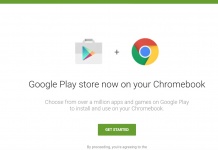 I use a handy little extension called AdBlock in my Google Chrome browser. I will disable it for certain sites if I feel they merit it (or, grudgingly, if they disable important functions of the sites if ads are blocked) but on the whole I’m happy not to see flashing, animated, distracting advertisements when I’m trying to browse the web. And I’m happy that my pages load faster without them. Apparently a lot of other people use it, too—3 out of every 10 web users, in fact.
I use a handy little extension called AdBlock in my Google Chrome browser. I will disable it for certain sites if I feel they merit it (or, grudgingly, if they disable important functions of the sites if ads are blocked) but on the whole I’m happy not to see flashing, animated, distracting advertisements when I’m trying to browse the web. And I’m happy that my pages load faster without them. Apparently a lot of other people use it, too—3 out of every 10 web users, in fact.
But that’s apparently not satisfying enough for AdBlock’s developers. They’ve launched a crowdfunding project to get sufficient funds to launch an ad campaign to inform the 7 out of 10 Internet users who still see ads that they don’t have to anymore. A fairly successful campaign so far—it’s received over $52,000 on a $25,000 goal and still has 22 days to run. If it reaches a stretch goal of $150 it will take out a full-page ad in the New York Times. (There’s a further stretch goal for a Superbowl ad, but that seems unlikely.)
The video for the campaign talks about how much better the Internet will be if more people block ads. I certainly can agree with the sentiment—it’s sure better for me since I don’t have to put up with them—but all the same, I have to wonder: if more people block ads, how is that going to affect free content on the Internet?
I mean, sure, some sites can detect if they’re being ad-blocked and not show (or delay) the content until the blocking is disabled. (For example, if you block ads on Hulu, it will still show you the show, though it will pause twice as long as it would have taken to show the ads in their place.) But if all the sites did that, it would annoy users just as much as the ads do.
It seems like a lot of sites depend on annoying their users in one way or another to bring in the revenue to keep themselves running. And users are getting fed up with this. In addition to the free AdBlock, such products are available as a $140 hardware ad-blocker that will sit between your router and modem and block every ad for any machine on your network. People regularly use site reformatting services that strip ads and consolidate multiple pages into one.
While I don’t expect AdBlock’s ad campaign to change many minds right away, who knows how things will change as time goes on? Is it going to be good for the web if ads don’t bring enough revenue anymore? Could a subscription model help?
(I must admit, as concerning as this question is, you can nonetheless take my ad blocker when you pry it out of my cold dead fingers.)

































I don’t mind ads when they’re for products/services/stores that I’d actually consider using. I wouldn’t dream of using AdBlock when I visit Ravelry, for example, because I’ve found many items and small shops that genuinely interest me (and that I’ve indeed spent money on). And even the ads for items that I’m not interested in are generally visually appealing. Of course, that’s a site with a well-defined focus and that limits ads to items related to that focus; it’s harder to do that on a news site.
Still, if turning off AdBlock on your site gives me moving ads that distract me from reading the site’s text, or those disturbing or offensive ads for teeth whitening and belly fat removal and mortgage refinancing, then I’m leaving AdBlock on, and I don’t care if your site goes under. If you want me to look at ads on your site, then display ads *I* want to look at.